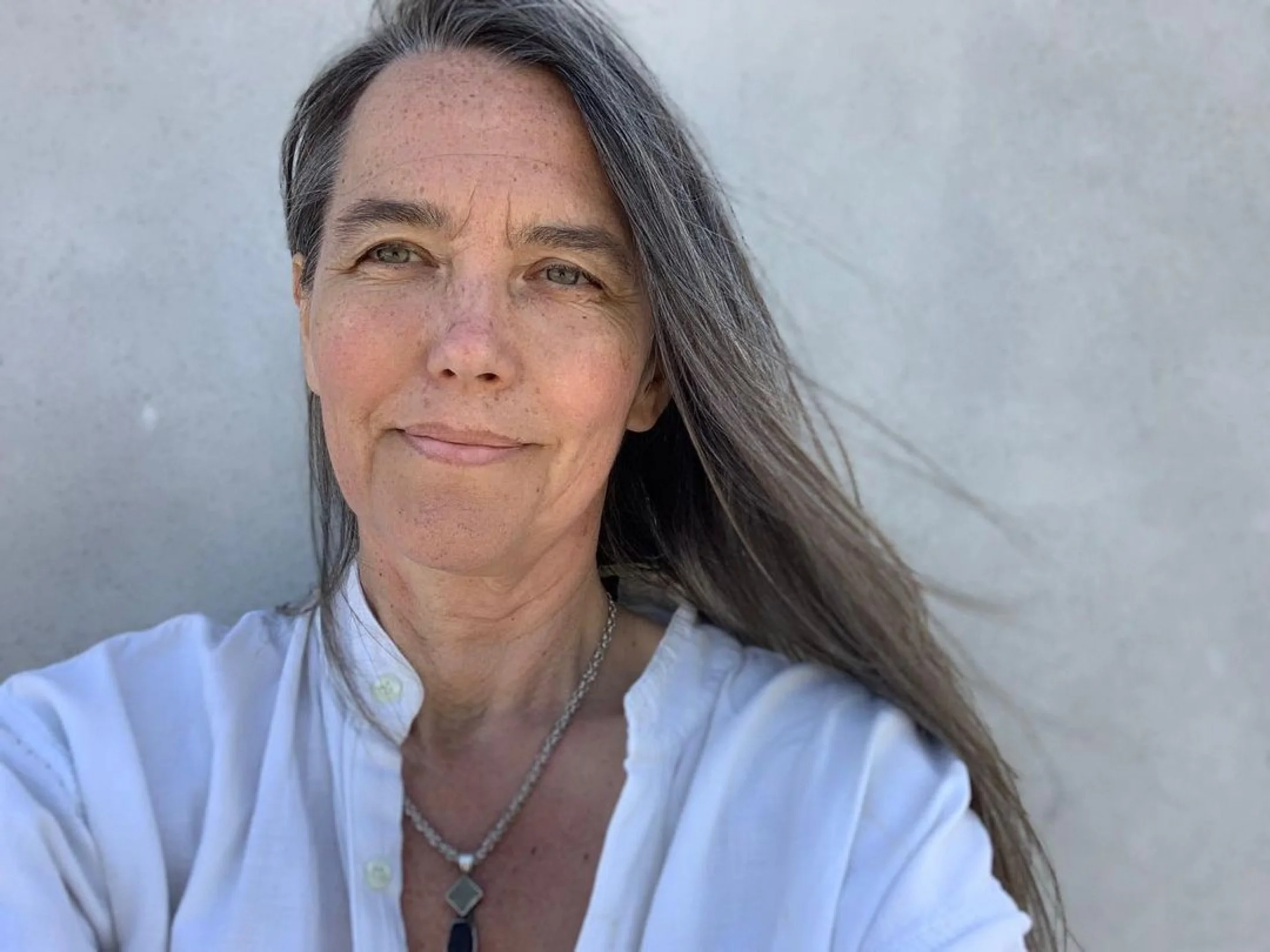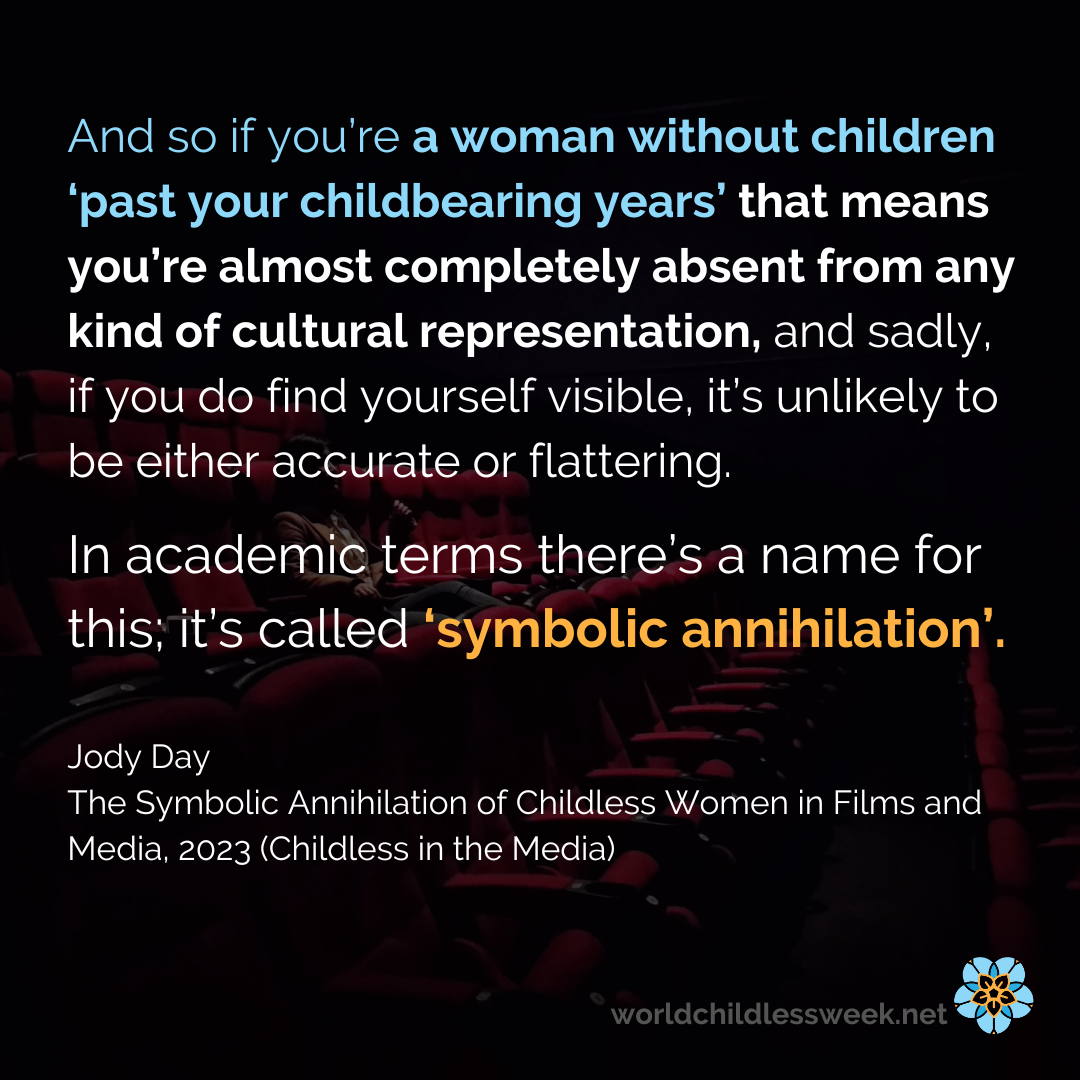Jody Day
Founder of Gateway Women
If you watch TV dramas or movies, read fiction, follow celebrity gossip, read women’s magazines, or pay attention to how products aimed at women are marketed, you wouldn’t think there was a woman alive who wasn’t dating, trying to conceive, pregnant, married, a mother or a grandmother! And so if you’re a woman without children ‘past your childbearing years’ that means you’re almost completely absent from any kind of cultural representation, and sadly, if you do find yourself visible, it’s unlikely to be either accurate or flattering.
In academic terms there’s a name for this; it’s called ‘symbolic annihilation’.
In the late 1970s, feminist scholar Gaye Tuchman described it as a process whereby the mass media ‘omit, trivialize or condemn’ certain societal ‘out groups’. Women without children in midlife and beyond are one of those groups.
When you consider that across the developed world, an average of 1 in 5 women over the age of forty-five don’t have children, we are glaringly missing from mainstream narratives, except during our potentially fertile years when, if we do show up, it will either be a ‘selfish’ childfree woman to be despised or a ‘desperate’ childless woman to be pitied.
Because of the inaccurate, limited and ugly stereotypes propagated by the media, those who do get to meet us in real life often unconsciously slot us into one of these internalized stereotypes and label us as some combination of selfish, career-driven or cold, and if we’re also unpartnered, as somehow too unattractive, picky or dumb to have been ‘chosen’ by a male partner to have children with. (Queer childless women don’t even get a look in, and their stories are even more stigmatised and hidden). In other words, whichever way you look at it, it’s clear that as far as the media (and thus mainstream opinion) goes, there’s obviously something very wrong with us. Sadly, before we understand this harsh pronatalist bias, we can often believe this of ourselves too. I did, and unpacking and debunking that was a huge part of my childless recovery.
In my book, ‘Living the Life Unexpected’, there’s a section called ‘50 Ways Not to be a Mother’, which includes reasons such as ‘Not getting pregnant accidentally on purpose’; or, ‘Your partner wanting to delay parenthood until it was too late’, or ‘Not meeting a partner during your potentially fertile years,’ or ‘Chronic illness,’ or ‘Choosing not to bring a child into an abusive relationship’, amongst many others - but such nuanced reasons for childlessness rarely feature in the plotlines of films and TV shows. Instead, if there is an evil, deviant, or just simply unlikeable female character, I know that at some point we’ll discover that she’s childless or childfree - I’m glad I never turned it into a drinking game, my liver would not have thanked me!
Because we are omitted from accurate media representations, we are omitted in many other ways in the culture too, including from political rhetoric, with its near-constant focus on ‘hard-working families’. Yet women without children pay their taxes to support the fabric of civil society, including funding the hospitals, schools and playgrounds that parents rely on for their children's well-being. And we do so willingly, yet our contribution is neither recognised nor valued. In the UK alone there are millions of women and men in midlife and beyond whose needs are not noticed by any political party. Yet women in this age group (particularly if they are also solo) have been shown to be the most active politically in terms of volunteering and financial contributions. I think that the first political party to recognise that all women’s needs must be equally considered, and not just those of mothers and families, may well see a huge surge in support.
Perhaps one of the most visible aspects of symbolic annihilation is that of trivialisation. Because currently, to be a woman without children, and particularly if you’re also single, is to be the butt of social jokes. It is perhaps most visible in the ‘crazy cat lady’ meme which is meant to be ‘funny’ but is actually a way of shaming middle-aged and older childless women, and scaring those still in their fertile years about the ‘awful’ fate of ageing alone without children that potentially awaits them. The UK charity Ageing Without Children estimates that the number of people over 65 without adult children is set to rise from 1.2 million at the present time to 2 million in 2030, and yet the issue is still considered too trivial to address or fund. When you compare this to the attention given to those living with dementia, a challenge that is recognised, but which will not reach the 2 million mark for almost another 30 years, you can see how warping symbolic annihilation can be.
The third aspect of symbolic annihilation identified by Gaye Tuchman is condemnation. This means that when a marginalised group do find themselves represented, it is often to be vilified in some way. To show that it’s not just a backlash against recent strides in gender equality, I’d like you to think for a moment about fairy tales, and specifically how the evil women of fairy tales are always childless. From Snow White’s evil stepmother to the child-eating witch of Hansel and Gretel, or the witch next door in Rapunzel, who steals the baby of her long-childless neighbours and locks her in a tower, using female childlessness as cultural shorthand for female deviancy has deep roots. Meanwhile, motherhood is often used to represent idealized female qualities such as loyalty, compassion, nurturing, selflessness, courage, etc, creating an archetype of perfection that sets the bar impossibly high for real-life flesh-and-blood mothers. Because none of us are either angels or devils, we’re all just perfectly imperfect humans, muddling through our lives like everyone else.
Moving forward to a more modern ‘fairy tale’, that of Disney’s 101 Dalmations, notice how the idealised maternal figure of ‘Anita’ (taking care of the 101 dogs of the title as well as having a baby of her own) is contrasted with her childless schoolfriend ‘Cruella de Vil’, who is so vain and evil that she wants to buy all the baby Dalmatians to have them made into a coat and has a mansion full of puppies that she’s rearing for exactly that purpose. According to the Disney Wiki fan page, Cruella de Vil was once voted the 39th greatest movie villain of all time and turns up in The Simpsons as a character in her own right. She is an exaggerated fictional embodiment of the darker elements of the childless stereotype, showing that a financially independent, single woman without children might also mean being evil, unattractive, and even homicidally insane. What a powerful warning message she unconsciously sends to children: reproduce, or else!
An early iconic film that spelled this out clearly was Adrian Lyne’s 1987 ‘Fatal Attraction’, in which Glenn Close plays ‘Alex’, a single woman who has a weekend affair with a married man (Michael Douglas) but refuses to let it end. She may or may not be pregnant with his child and becomes obsessed with him, stalking him and his ‘perfect family’. She tries to wreck his marriage, abducts his young daughter for a day at the fairground and goes so far as to kill the girl’s pet rabbit and leave it boiling on the family stove; the origins of the term ‘bunny boiler’ to refer to a single woman, dating and hopeful of having children, and therefore possibly slightly deranged as a result. So, perhaps it will come as little surprise to you who Disney chose to cast as Cruella de Vil in its 1996 film version of 101 Dalmations: Glenn Close!
More recently, 2016’s Girl on a Train worked to subvert the stereotype of the unhinged childless woman, although very few childless women I know were able to get past the opening sequences, which show ‘Rachel’ (Emily Blunt), now a blackout-prone alcoholic divorcee after failed infertility treatments, voyeuristically observing the lives of two happy couples from her daily commuter train. One of the couples is her ex-husband with his new wife and young baby; the wife of the other couple works as their nanny. When the nanny is murdered, ‘Rachel’ becomes a suspect. Without completely spoiling it for you, the irony is that Girl on a Train, a film which often tops the list of childless women’s least favourite film, actually ends by vindicating the vilified childless ‘Rachel’ - and not by providing her with a miracle baby either (as is the usual way to solve the ‘dilemma’ of the childless character). But you have to make it through the film to find that out!
Symbolic annihilation is a form of cultural shaming, and shame can lead to low self-esteem, isolation, depression, ill health, and a massive loss of human potential. Perhaps when our survival as a tribe and species depended on numbers, a woman without children would have been a big deal; but as there are now double the number of people on earth than there were in 1970, just over 8 billion, and with an estimated growth to around 10.5 billion expected by the end of this century, we have other much more pressing problems to deal with. However, with birth rates falling across developed countries for a host of complex reasons including choice and circumstance, and the UN predicting that this trend will increase, it’s still astounding to me how governments and pundits focus on how catastrophic such a demographic shift will be for our societies, rather than to look up and face the actual catastrophic threats of climate breakdown. It seems that the idea that women without children are the villains, whatever the story, is a hard one to shake.
Although I wanted to be a mother with all my heart, and respect and support the mothers in my life and in wider society, this does not mean that motherhood is the only meaningful and fulfilling way to be a woman; it’s also one that restricts many other choices, many other ways of contributing to the world. And although motherhood is of crucial value to an individual woman’s child, it is not necessarily the only or the most meaningful contribution that each individual woman can make to our society. I’ve been curating a list of childless/childfree female role models on Pinterest for over a decade, and we have made some wonderful contributions to the world, in all areas. However, it is not necessary to live a noteworthy life just because you are childless; that’s just more pronatalism by the back door. Living a quiet, happy and fulfilled life as a childless woman is already a major achievement, and in doing so, you may already be a role model to more people than you realise.
Because, as non-mother Rebecca Solnit wrote in her 2015 Harper’s Magazine article ‘The Mother of All Questions’, ‘There are so many things to love besides one’s own offspring, so many things that need love, so much other work love has to do in the world.’
I just wish the media would catch up with that.
Photo by Karen Zhao on Unsplash


